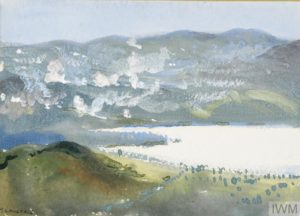Monday June 17th, 1918
Reveille 4:30. Parade 7am – 10am. Mail up – three letters from Shaw, one from home, one H. Hammer and one from Harry. Very hot again, sweating to grease. Wonder when we will leave this country. Hope soon.
The Dojran Front
Frank expresses the hope that the 13th will be leaving the country soon. By coincidence, under the by-line of Gerald Cumberland, an article appears in the Guardian today entitled ‘A Spring Night in Northern Greece’.¹
Gerald Cumberland was the pen-name of Charles Frederick Kenyon, British author, journalist, poet and composer. He seems to have been serving on the Dojran Front in 1918 – but I have failed to find any document trail to support this. Any help gratefully received!
He writes compellingly of spending a dark night in the trenches. Here are some memorable passages.
On Trenches & Sentry Duty
‘There is not a sound save the music of many nightingales singing in the valley below, where some of the lanes are like the lanes of Devon, banked and flowered and scented, Johnny Bulgar is quiet for a time, but during the course of my duty I have the tense feeling of waiting for something to happen, and as I walk along our sector of trenches, stumbling over the duckboards, I wonder for how long this quietness will be left to us.’
‘The men on sentry duty are part of the darkness; but feeling my way as I go, my hand touches the prone bodies of those who sleep, or if I stand and listen I hear the deep breathing of men who, an hour or two hence will replace those who now stand by their side.’
‘I creep into the telephone dug-out, and find a boy eating a hunk of bread and reading a month-old newspaper. The light of the one candle dazzles me, but for a few moments I sit with him and take a few puffs of a cigarette and then emerge once more into the night.’
‘A cool wind stirs, and the rustle of the leaves sounds strangely English. But the wind soon dies and the stale smell of the trench fills my nostrils.’
On Artillery Fire
‘Starlights fight with and are conquered by the black darkness, and soon our own sector comes under the enemy’s fire. I remember, astonished, that the first time I was under shell fire I felt nothing but exhilaration but now that old, sick, distressing feeling that I have so frequently experienced during the last twelve months comes upon me. With difficulty I throw it off and look at my watch – it is nearly midnight … A stretcher-bearer comes panting and falling down the trench. A man has been badly hit. He is taken back over the top, his side gushing blood. He is our only casualty tonight, for soon silence comes again.’
On Dawn

‘Dawn is coming, and there is gradually unfolded a scene so fairy-like… Words cannot paint scenes. You must imagine a lake, a mountain tarn, at your feet. This is Doiran Lake. It is cupped in mountains, the precipitous Belashitza range bounding it on the farther side. And you must imagine the most delicate of purple mists dissolving visibly and revealing great spaces all colour; stretches of water blue as hyacinths, stretches of mountain blue green, stretches of swamp-land like vivid green seaweed. And when the sun has risen everything is incredibly near. Grand Couronne himself is so near that it seems that if you stretched out your arm your hand would rest on his summit. Serbia lies before you and your eye, searching every acre of ground for miles in front and on both flanks will not see a single sign of human life, nor will it detect the edge of the dongas and ravines in many of which the enemy is hidden…’
I wonder if Frank and the 13th will take such memories, both foul and beautiful, away from this foreign land.
13th (Service) Battalion War Diary – 17th June 1918 – La Marraine
Work and fatigues as usual.
References & Further Reading
¹ ‘A Spring Night in Northern Greece’ by Gerald Cumberland, The Guardian, June 17th, 1918 (page 8)
² Gerald Cumberland on Wikipedia
* (Art.IWM ART 1864), painted in 1917 by Thomas Cantrell Dugdale, copyright Imperial War Museums


